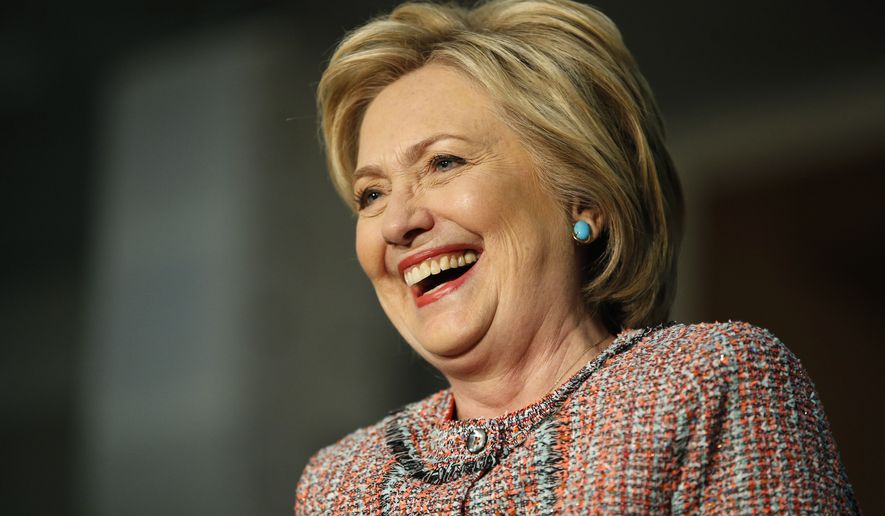Hillary Clinton has sewn up enough delegates to win the Democratic presidential nomination, according to an Associated Press tally, cementing her as the first woman to helm a major party into the general election.
A combination of delegates won in weekend primaries and commitments by party superdelegates put her over the top, the news service said. She still needs to keep those superdelegates in line through next month’s convention in Philadelphia, and her chief opponent, Sen. Bernard Sanders, has vowed to try to persuade them to swing behind him.
Mr. Sanders is also hoping for a big showing Tuesday in California and other states voting in the final primaries of the season. Though he cannot win enough delegates to claim victory, a strong end could bolster his case to the superdelegates and help him avoid being seen as narcissistic as he continues his campaign.
Some of the maverick senator’s supporters already were looking past his bid, saying Democratic leaders must be sure to do what they can to bring Sanders voters into the fold ahead of November.
Mrs. Clinton will face off against Donald Trump, who outlasted a large and talented field to claim enough delegates a month ago for the Republican nomination.
Mrs. Clinton has had a much tougher time despite a more shallow field. Only Mr. Sanders put up any real opposition, and he has stretched Mrs. Clinton far beyond what party leaders expected.
SEE ALSO: Obama endorsement of Clinton could come Wednesday
The former secretary of state, U.S. senator from New York and first lady hit the requisite number of 2,383 delegates needed to become the presumptive Democratic nominee after a decisive weekend victory in Puerto Rico.
Mrs. Clinton has 1,812 pledged delegates won in primaries and caucuses. She also has the support of 571 superdelegates, according to the AP’s updated count Monday night.
“It is unfortunate that the media, in a rush to judgment, are ignoring the Democratic National Committee’s clear statement that it is wrong to count the votes of superdelegates before they actually vote at the convention this summer,” Sanders campaign spokesman Michael Briggs said in a statement.
Mr. Sanders gave no sign of backing off. He has campaigned hard across California in recent weeks, hoping a big win will be justification to remain in the race until the Democratic convention and raise doubts about Mrs. Clinton’s viability.
“It is extremely unlikely that Secretary Clinton will have the requisite number of pledged delegates to claim victory on Tuesday night,” Mr. Sanders said during a news conference over the weekend in California. “At the end of the nominating process, no candidate will have enough pledged delegates to call the campaign a victory. That will be dependent upon superdelegates. In other words, the Democratic National Convention will be a contested convention.”
Democrats in Montana, North Dakota, New Jersey, New Mexico and South Dakota also will go to the polls Tuesday.
SEE ALSO: Hillary Clinton’s campaign manager, Robby Mook: ‘We are going to have a nominee tomorrow’
Mr. Sanders’ strategy presents a problem for the Clinton campaign and for the Democratic Party establishment, both of which are eager to move past the primary contests and focus their attention and energy on attacking Mr. Trump. Even President Obama reportedly is considering officially endorsing Mrs. Clinton on Wednesday, a move that seemingly would signal the end of the Democratic primary fight.
For now, there is little evidence superdelegates are looking to jump ship.
“He needs to display some kind of a strategy, make clear there’s kind of a plan. Otherwise, it looks like you’re a narcissistic politician who is in to win at any cost,” said Brandon Rottinghaus, a political science professor at the University of Houston who specializes in presidential leadership.
“He will start to lose the support of his potential allies within the party. [Mrs. Clinton] is going to focus on trying to bring people together. If he continues to try to push the issue, I think even his supporters will abandon him. A movement is all well and good, but the party still needs to win an election,” Mr. Rottinghaus said.
The California primary has 548 delegates at stake.
Seventy-three are superdelegates, and of those, at least 61 have come out in favor of Mrs. Clinton.
The presumptive nominee largely has ceased attacks on Mr. Sanders and says she wants to unify the Democratic Party after the California contest. She acknowledges, however, that the fight is not officially over.
“I know there is a lot of work still going on,” she said Monday in California. “It’s not over until it’s over, and tomorrow is a really important day, particularly here in California.”
Sanders supporters say the campaign has energized progressives and that the senator has earned the right to stay in the race until the convention.
“Simply put, while there are still contests ahead, there’s no reason for Bernie Sanders to do anything that doesn’t help his campaign or the issues he’s waged it on earn more support,” said Neil Sroka, spokesman for the liberal PAC Democracy for America, which is backing Mr. Sanders. “After winning 20 states and bringing millions of new populist-progressive voters into the political process, Bernie Sanders and the grass-roots movement behind him has more than earned the right to lay out their own path toward uniting the party at the convention and helping lead Democrats to defeat Donald Trump in November.”
• S.A. Miller can be reached at smiller@washingtontimes.com.
• Ben Wolfgang can be reached at bwolfgang@washingtontimes.com.




Please read our comment policy before commenting.